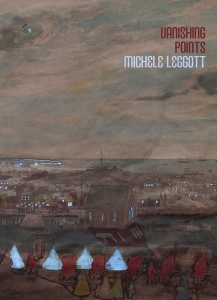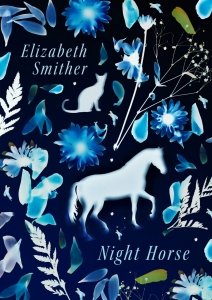
 Vanishing Points by Michele Leggott
Vanishing Points by Michele Leggott
Auckland University Press, 2017
Night Horse by Elizabeth Smither
Auckland University Press, 2017
Michelle Leggott and Elizabeth Smither are both former Poet Laureates, with distinguished careers behind them. Night Horse won the poetry category of the 50th Ockham New Zealand Book Awards and Vanishing Points has already been received to great acclaim. Even though there are some major stylistic differences between these two books, there are many surprising coincidences.
Published by Auckland University Press, they offer intimate observations about family, bodily deterioration and death. As New Zealand poets, they belong to a relatively small community so it’s not entirely surprising that they both commemorate Jeny Curnow, the wife of poet Allen Curnow, who died in 2013. As a poet in her late seventies, Smither is concerned with the mortality of friends and family yet she takes obvious pleasure in everyday encounters. In ‘Tonia’s cemetery’ she visits her friend’s future resting place and remarks drily: ‘how well you had selected / your place, far better than your houses.’
Leggott’s gradual loss of sight is a central theme in her book, as it was for her fourth collection of poetry, As Far As I Can See (1999). The tone can be mournful, regretting the loss, but she also recognises that other senses are sharpened. There are scents of frangipani — whether real or imagined — karaka berries knobbly underfoot and the sound of Segways passing by. Sometimes it’s hard to tell what is perceived in the moment or recalled from another time: ‘So it is still possible to step ashore on the islands of visions and say I remember. It was like this.’ And there’s a sense of wonder at certain moments of partial sight: ‘I saw my hand against a sunlit wall. Just for a moment.’ For Leggott, moving through interior spaces feels like a kind of swimming, with a choreography of its own: ‘Blind Swimming. Let your hands find each doorway, let your / fingers trail the edges of furniture, the tops of balustrades and / the walls of hallways with their punctuating spaces.’ For Leggott, swimming is a way to extend her reach.
The attention paid to non-human creatures is another common theme: Smither populates her book with birds, cats and horses. She writes of a kangaroo with a ‘look of deep retiring modesty / one in authority with the landscape.’ The horse of the title ‘moves in a trance / so compelling, so other-worldly/ it doesn’t see the car lights’ Leggott’s guide dog, Olive, is a constant companion in her prose poems — there’s even a photo of the two of them in the press release. Her canine companion is riffed on, transformed, becoming ‘the dog of tears’ who will bark holes in the last page of the book and lead her through one of them. Leggott also enjoys her presence when Olive is not working, shaking hands repeatedly: ‘I feel her toes flex and the nails close over the hand that is holding hers. I do this again and again, to feel her hand close on mine.’ This is as good as listening to her drinking from her water bowl, which reminds the poet of Gertrude Stein’s little dog and what listening to the rhythm of his drinking taught her about the differences between sentences and paragraphs: ‘That paragraphs are emotional and sentences are not.’ The dog takes part in a Modern Poetry class and her lapping is recorded and amplified for the purpose of close listening.
Smither and Leggott are very much concerned with family and questions of inheritance. Smither describes a drive past ‘my mother’s house’, of which the view is intimate yet distant: ‘It was all those unseen moments we do not see / the best of a friend, the best of a mother / competent and gracious in her solitude.’ She recognises the precious nature of this passing glimpse and its intimation that her mother ‘would soon walk into the last room / of her life and go to sleep in it.’ Smither’s mother re-appears during a stay in hospital: ‘I shall have my way with my daughter / I shall bring her out of this place / of bogus and fruitless whiteness / her wound will heal under my ministrations.’ The poet’s mother, with Marcel wave and gloves, is more real than the details of the room, suggesting that the desire for your mother persists even into later years.













